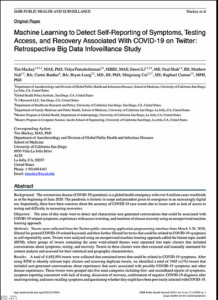S-3 Research uses Big Data and AI to help stop illegal opioid and other dark-web drug sales
By Jason Langendorf
To put a face and real story to the tragedy of the opioid prescription crisis, meet Ryan Haight. He was an A student and an athlete, a high-schooler living in San Diego with what appeared to be a bright future ahead of him. In 2001, he used the internet to purchase an illegal opioid, Vicodin, from a doctor he had never met, then overdosed and died. He was 18.

Three years ago, Timothy Mackey participated in a code-a-thon sponsored by the U.S. Department of Health and Human Services (HHS), invoking Ryan’s name and the law he inspired: the Ryan Haight Act, which restricts providers from prescribing controlled substances without conducting an in-person examination. At the time, Mackey, an associate professor at the UC San Diego School of Medicine and a healthcare policy researcher, had no idea that his presentation would lead to his central role in building one of the government’s most important tools in enforcing the Ryan Haight Act and tracking down illegal online opioid sales.
“That,” Mackey says, “was the start of the company, essentially.”
A lot of substance-use-disorder technologies, there’s not really a great market for it from an investment perspective or from a commercial perspective, because there’s not always a clear revenue stream from these products. So in recognition of that, the government knows that they have to support these smaller businesses that are looking to be responsive to public health emergencies.”—Timothy Mackey, founder and CEO, S-3 Research
Big Data Takes on Opioids

The company is Mackey’s S-3 Research, which calls itself “a big data, machine learning, block chain and data visualization startup” focused on technology development and protecting public safety from the dark web. Mackey’s previous work—mostly researching policy and technology associated with global global health issues—had been limited to academia. But when a paper written by his UCSD group caught the eye of the Centers for Disease Control and Prevention (CDC), Mackey and his colleagues were invited to to present.
The grand prize went to another group, but the code-a-thon helped Mackey win something else: a contract with HHS.
Mackey was encouraged by the National Institutes of Health (NIH) and UCSD staff to create a startup. A grant to further develop his group’s work was available, and NIH would help mentor Mackey through the application process. There was one caveat: Any funding would have to be used privately, rather than through the university. And so began S-3 Research, which won the grant and immediately commenced work with federal law enforcement on the problem of dark-web illegal opioid sales.
“They saw, with us, that we were addressing an issue that was going to be kind of a big problem moving forward—the illicit diversion of drugs online,” Mackey says.
“A lot of substance-use-disorder technologies, there’s not really a great market for it from an investment perspective or from a commercial perspective, because there’s not always a clear revenue stream from these products. So in recognition of that, the government knows that they have to support these smaller businesses that are looking to be responsive to public health emergencies.”

How S-3 Tech Works
The artificial intelligence (AI) developed by S-3 Research was built around machine learning, HTML classification and automated regulatory response. Simply put, the AI scrapes the web for data on various online platforms, including social media, search engines, Google forums and other areas where illicit drug sellers most often hang their shingles. It searches for opioid-related keywords—everything from “OxyContin” to “Hillbilly Blues”—and identifies the sellers amid all the data using an algorithm.
Mackey says the tech is flexible enough to be repurposed for other uses, such as wildlife trafficking and police bribery. “A lot of the work we’ve done over the last year has been around illegal COVID tests,” Mackey says. “We’re looking at illegal vaccines being sold online.”
If all this sounds like something you might find in a Bourne movie, or a tad Orwellian, you can be forgiven for your concerns about privacy and government overreach. But Mackey says S-3 Research only mines publicly available data, and that his company controls the surveillance and reporting aspects of any program, taking pains to censor any sensitive information. He understands the potential implications of his tech, and he says the federal government has been a “great partner” that has been similarly receptive to those concerns.
Mackey also wants to do his part to prevent others from following in the footsteps of Ryan Haight. “A lot of our studies are subject to more robust ethics requirements, because of journals and because of me being a professor, than most companies would do,” Mackey says. “A lot of companies are just simply mining this data and reselling it, and there’s very little control to it. So from our standpoint, we definitely have controls in place. And we recognize that it’s a difficult thing because we don’t want to discourage conversations and further stigmatize users.
“But at the same time, at a certain point, what we’re doing is not enough. We need to educate consumers about the risks, and that’s not a step we’ve taken. Maybe that’s for someone else, but hopefully in the future we’ll get to a point where we can do more intervention-related work.”













